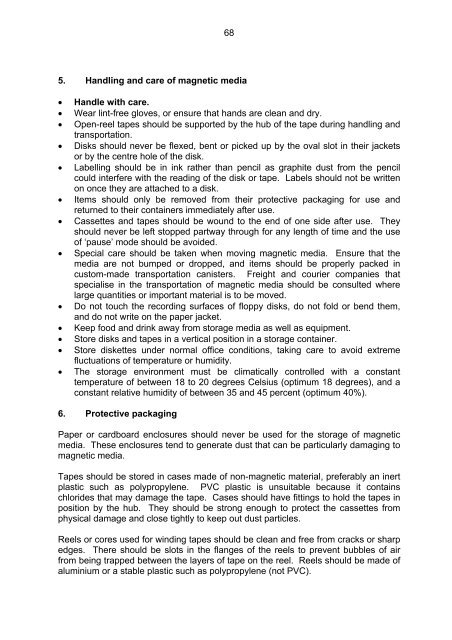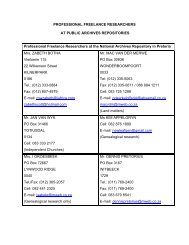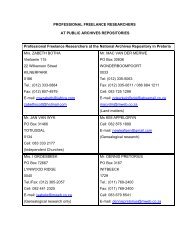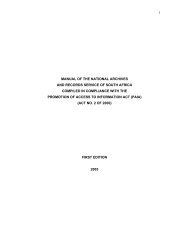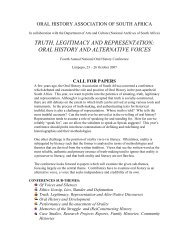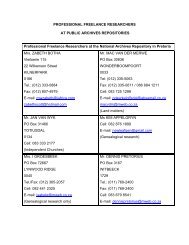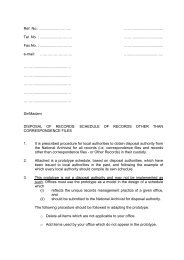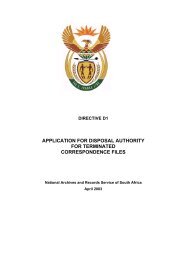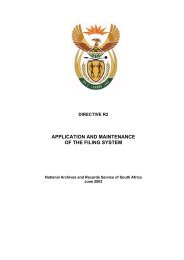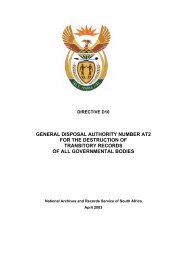managing electronic records in governmental bodies - National ...
managing electronic records in governmental bodies - National ...
managing electronic records in governmental bodies - National ...
You also want an ePaper? Increase the reach of your titles
YUMPU automatically turns print PDFs into web optimized ePapers that Google loves.
68<br />
5. Handl<strong>in</strong>g and care of magnetic media<br />
• Handle with care.<br />
• Wear l<strong>in</strong>t-free gloves, or ensure that hands are clean and dry.<br />
• Open-reel tapes should be supported by the hub of the tape dur<strong>in</strong>g handl<strong>in</strong>g and<br />
transportation.<br />
• Disks should never be flexed, bent or picked up by the oval slot <strong>in</strong> their jackets<br />
or by the centre hole of the disk.<br />
• Labell<strong>in</strong>g should be <strong>in</strong> <strong>in</strong>k rather than pencil as graphite dust from the pencil<br />
could <strong>in</strong>terfere with the read<strong>in</strong>g of the disk or tape. Labels should not be written<br />
on once they are attached to a disk.<br />
• Items should only be removed from their protective packag<strong>in</strong>g for use and<br />
returned to their conta<strong>in</strong>ers immediately after use.<br />
• Cassettes and tapes should be wound to the end of one side after use. They<br />
should never be left stopped partway through for any length of time and the use<br />
of ‘pause’ mode should be avoided.<br />
• Special care should be taken when mov<strong>in</strong>g magnetic media. Ensure that the<br />
media are not bumped or dropped, and items should be properly packed <strong>in</strong><br />
custom-made transportation canisters. Freight and courier companies that<br />
specialise <strong>in</strong> the transportation of magnetic media should be consulted where<br />
large quantities or important material is to be moved.<br />
• Do not touch the record<strong>in</strong>g surfaces of floppy disks, do not fold or bend them,<br />
and do not write on the paper jacket.<br />
• Keep food and dr<strong>in</strong>k away from storage media as well as equipment.<br />
• Store disks and tapes <strong>in</strong> a vertical position <strong>in</strong> a storage conta<strong>in</strong>er.<br />
• Store diskettes under normal office conditions, tak<strong>in</strong>g care to avoid extreme<br />
fluctuations of temperature or humidity.<br />
• The storage environment must be climatically controlled with a constant<br />
temperature of between 18 to 20 degrees Celsius (optimum 18 degrees), and a<br />
constant relative humidity of between 35 and 45 percent (optimum 40%).<br />
6. Protective packag<strong>in</strong>g<br />
Paper or cardboard enclosures should never be used for the storage of magnetic<br />
media. These enclosures tend to generate dust that can be particularly damag<strong>in</strong>g to<br />
magnetic media.<br />
Tapes should be stored <strong>in</strong> cases made of non-magnetic material, preferably an <strong>in</strong>ert<br />
plastic such as polypropylene. PVC plastic is unsuitable because it conta<strong>in</strong>s<br />
chlorides that may damage the tape. Cases should have fitt<strong>in</strong>gs to hold the tapes <strong>in</strong><br />
position by the hub. They should be strong enough to protect the cassettes from<br />
physical damage and close tightly to keep out dust particles.<br />
Reels or cores used for w<strong>in</strong>d<strong>in</strong>g tapes should be clean and free from cracks or sharp<br />
edges. There should be slots <strong>in</strong> the flanges of the reels to prevent bubbles of air<br />
from be<strong>in</strong>g trapped between the layers of tape on the reel. Reels should be made of<br />
alum<strong>in</strong>ium or a stable plastic such as polypropylene (not PVC).


